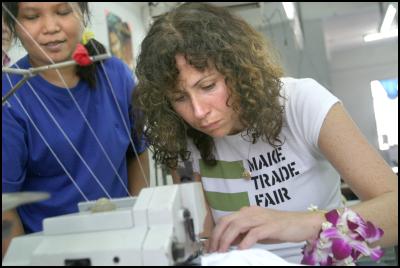The secret (not glamorous) life of garment workers
Media Release
For immediate release: February 9, 2004
The secret (and not so glamorous) life of garment workers

CAPTION: Jaruwan Pol-in
from Bangkok’s Solidarity Cooperative shows Minnie Driver
how to make a T-shirt. Solidarity is Thailand’s first
workers cooperative garment factory and was set up by former
employees of the huge Bed & Bath Prestige which produced
brands such as Nike, Adidas and Levi’s. Bed & Bath closed
without warning in October 2002. Overnight more than 900
workers, most of whom were women, lost their jobs and their
livelihoods with no severance pay.
Big brand companies and retailers in the fashion industry are driving down employment conditions for millions of women workers around the world, according to a new study by international agency Oxfam.
Oxfam New Zealand says that women workers are increasingly being forced to work at high-speed for low wages over longer hours. Most have no sick leave or maternity leave, often endure intimidation in the workplace and are frequently penalised for joining unions. In China, for example, young women face 150 hours of overtime each month and 90% have no access to social insurance.
“Multinational companies are using their power at the top of global supply chains to bully suppliers into greater flexibility, higher quality and shorter delivery times, as well as cheaper prices” said Barry Coates, Executive Director of Oxfam New Zealand. “This pressure is dumped immediately onto women workers in the form of longer hours, often in poor conditions and with no job security.”
New Zealand imports over $800 million worth of clothing annually, much of it sold by a few large chain retailers. “The impact of this is that retailers are able to set terms that wholesalers have little choice but to meet,” said Coates.
“Many corporations have codes of conduct to hold their suppliers accountable for labour standards. But it is often their own competitive purchasing practices that undermine the push for better conditions.“ adds Coates. “It is in each company’s interest to demonstrate that their purchasing practices ensure that labour rights for garment workers are upheld.”
Oxfam’s report, Trading Away Our Rights, includes research from rich and poor countries, and interviews with over 1,000 workers, factory owners, brands, importers, exporters, union and government officials. Oxfam documents hundreds of abuses happening in countries across the world. “We have to do overtime until midnight to earn a decent income. I am afraid of having children because I wouldn’t be able to feed them” said Nong, 26, who sews underwear for Victoria’s Secret in Thailand.
“International trade has the potential to help lift people out of poverty,” says Coates. “But all too often, workers at the bottom of the global supply chains are exploited to benefit shareholders’ returns. Oxfam is calling on companies to act responsibly and address the impacts of their own sourcing and purchasing practices on the way that producers hire and treat their workers.”
Notes to editors
Actress Minnie Driver launched the Oxfam report ‘Trading Away Our Rights’ at a press conference and fashion show in Phnom Penh, Cambodia on Sunday 8 February. Ms Driver spoke of her experiences at the end of a fact-finding tour of the garment industry in Thailand and Cambodia.
http://www.oxfam.org.nz
http://www.maketradefair.org


 Gordon Campbell: On The Left’s Electability Crisis, And The Abundance Ecotopia
Gordon Campbell: On The Left’s Electability Crisis, And The Abundance Ecotopia Regional and Unitary Councils Aotearoa: Regional And Unitary Councils Back A Practical FWFP System
Regional and Unitary Councils Aotearoa: Regional And Unitary Councils Back A Practical FWFP System NZ Government: Stay Safe On Our Roads This Easter
NZ Government: Stay Safe On Our Roads This Easter YWCA: Global Push Back Against Gender Equality A Growing Crisis In Aotearoa
YWCA: Global Push Back Against Gender Equality A Growing Crisis In Aotearoa Te Pāti Māori: Ngarewa-Packer - Fast-Tracking Seabed Mining Ignores Māori Opposition And Environmental Precedent
Te Pāti Māori: Ngarewa-Packer - Fast-Tracking Seabed Mining Ignores Māori Opposition And Environmental Precedent New Zealand Defence Force: Defence And Customs Strengthen Maritime Security With Uncrewed Surface Vessels
New Zealand Defence Force: Defence And Customs Strengthen Maritime Security With Uncrewed Surface Vessels SPCA: Huge Win With New Dog Tethering Regulations
SPCA: Huge Win With New Dog Tethering Regulations


